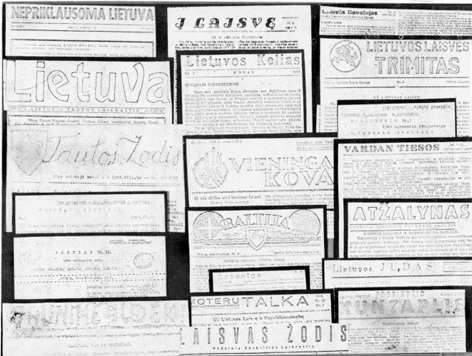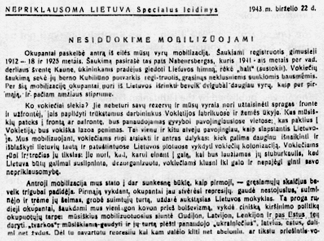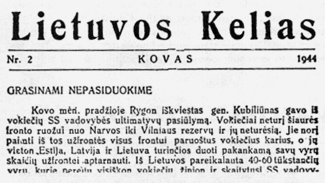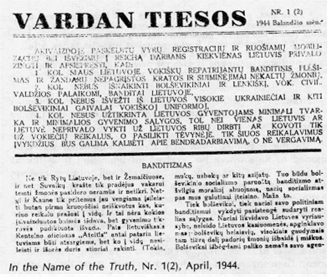Editor of this issue: Antanas Dundzila
Copyright © 1986 LITUANUS Foundation, Inc.

|
LITUANUS
LITHUANIAN QUARTERLY JOURNAL OF ARTS AND SCIENCES
Volume 32, No. 4 - Winter 1986
Editor of this issue: Antanas Dundzila ISSN 0024-5089
Copyright © 1986 LITUANUS Foundation, Inc. |

|
SAMPLES OF LITHUANIAN UNDERGROUND PRESS DURING GERMAN OCCUPATION
PHOTO CAPTIONS AND TRANSLATIONS
BY SIGITA NAUJOKAITIS
Examples of the numerous underground newspapers which were published and distributed regularly by the many groups actively organizing the opposition to the German occupation of Lithuania. Among the examples shown from the B. Kviklys archives (upper left hand column reading down):

Independent Lithuania, Nr. 9(2), June 1, 1943, 2nd year;
Lithuania, The Newspaper of the Lithuanian Nation, Nr. 7(2711), June 30, 1943;
National Comment, In its 2nd year of publication, Nr. 10(17), August 10, 1943;
The Combating Lithuanian, "He who surrenders perishes, he who fights wins!," Nr. 2, April 24, 1943;
The Front, Nr. 10, In its 2nd year of publication, published by the Lithuanian Freedom Fighters' League, November 30, 1943;
Youth, Be On Guard!, 2nd Year, Nr. I, April 16, 1944;
To Freedom, N r. 9, May 25, 1943; Lithuania's Course, Nr. 2, March, 1944;
The United Struggle, "We'll win or we'll perish, but we'll not be slaves," Nr. 4(12), February 27, 1944;
The Baltic, published by the Baltic Unification League, Nr. 2, February, 1944;
The Survey, published by the Lithuanian Freedom Fighters' League, Nr. 37, September 22, 1943;
Women's Relief; Nr. 1, March 12, 1944;
Free Speech, The Newspaper of the Kėdainiai District, Nr. 3, August 11, 1941;
Lithuania's Freedom Bugle, Published by the Lithuanian National Guard, Nr. 3, December 1943;
Lithuanian National Guard N. District Bulletin, Nr. 3, End of February, 1944;
In the Name of the Truth, Nr. 1(2), April, 1944;
Underwood (The Rising Generation, published by the Lithuanian Unification League, (undated);
Lithuania's Judas, In the 3rd year of German occupation, September 13, 1943;
The Underground Slipper, a satyrical review, trans. Nr. 2(3), March 25, 1944.

Special issue of Independent Lithuania, June 22,1943, exhorting Lithuanians to resist mobilization.
The Germans had declared a second mobilization demanding three times as many men as they had during the first. They gathered who they could by "hunting down those who refused to comply, exiling their families, robbing them, closing schools of higher learning," and, as a cynical political ploy, "calling to arms all those who would fight Bolshevism."
What were the Germans up to now? They no longer had their own reserves and wanted to use Lithuanian men to fill the gaps at the front and in the rear battlefields, and to swell the number of German factory and farm workers. The article further states that in mobilizing Lithuanians, the Germans wanted to eliminate as many of them as possible, leaving the land free for further German colonization and the people disorganized, unable to continue fighting for their independence.
It was a critical moment for the Lithuanians. The Supreme Lithuanian .Committee urgently appealed to them to oppose German mobilization in unison: "When called, let us not join; when hunted, let us hide; when caught, let us escape from the Germans. Let us save our forces for our most important aim the decisive battle for independent Lithuania and the establishment of our free future."

From an article in the underground newspaper Lithuania's Course, Nr. 2, March, 1944, entitled "Let us not give in when threatened."
"In the beginning of March, General Kubiliūnas was summoned to Riga where he received an ultimatum from the SS leadership. The Germans do not have, and will not have, reserves for the frontal zone from Narva to Vilnius. They want to take all battle-ready German soldiers from this rear battle zone. Estonia, Latvia, and Lithuania are to provide enough of their men to service this area. Forty to sixty thousand (40,000-60,000) men are required from Lithuania. They would come under direct German command and answer to SS leadership. If Lithuania were not to provide these men, Germany would be forced to pull back the front to Germany's borders thus giving up the Baltic countries to the Bolsheviks. On the other hand, if Lithuania complied, the country would not be required to provide one-hundred thousand (100,000) workers (for the Reich, trans.)"
The article further states that General Plechavičius and Colonel Urbonas, representing Lithuania, also took part in discussions about the re-establishment of the Lithuanian National Guard and the formation of Lithuanian divisions. Though Lithuanians had been trying for some time to organize their own army, the Germans had refused them any autonomy, insisting that division leaders be Germans.
The tone of the article is bitterly anti-Nazi Germany, stating that "Brown Germany" started the war in order to become Europe's dictator. It has thrown the yoke of German colonization and slavery on the countries it occupied with, as in Lithuania's case, not one word regarding the re-establishment of its sovereignty. Although the tide had turned at the German front, with the attackers retreating, the Nazi approach to Lithuania was still the same refusal to understand and acknowledge its aims. This was a demand to surrender everything with nothing offered in return.

In the Name of the Truth, Nr. 1(2), April, 1944.
The article addresses the terrorization of the populace which was marauded by groups of bandits. In the face of declared mobilization and deportation of workers to the Reich, every Lithuanian should know that the Germans are responsible for the disintegration of law and order. Their refusal to maintain order allowed bands of repatriated Germans to rob at will and permitted the military to search and arrest the innocent, among other grievances. The citizenry was against any sort of collaboration.
Further, the article accuses both the Bolsheviks and the Nazis of committing "political banditry" by liquidating the Lithuanian government and forbidding the reconstitution of the army. The retreating Bolsheviks left paid agents in place and the Nazis armed Bolshevik prisoners, thus abetting them to demoralize and destabilize the population.